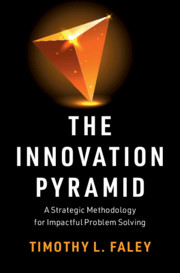Innovation Management
Innovation is both the creative and the destructive force at the centre of economic development. It is perhaps the best explanation of current human prosperity yet core to some of our most pressing societal problems. But how does innovation come about? How does it get managed in organizations? Moving from the most foundational ideas to the most cutting-edge debates in the field, this book serves as an invaluable companion to the field of innovation management. Each chapter summarises, discusses and critiques key academic texts, relating them to specific themes and connecting them to broader discussions in the field. Through this unique format, readers will gain insights into the important ideas and debates about innovation, how to manage it, and what it means for business and society. This book also brings interdisciplinary perspectives from economics, sociology, psychology, history and management into the conversation about how to think about innovation scientifically.
- Written in an accessible and engaging style that will ensure students' first encounter with innovation management will be one that spurs interest and showcases why this is such a fascinating field Each chapter links the theoretical ideas of key academic texts in innovation management with a collective theme, such as technological change and industrial dynamics; the social consequences of innovation; how to manage innovation processes; and organizing for both efficiency and innovation
- Draws on a wealth of empirical examples to illustrate the dynamics of innovation, including satellite radio; semiconductor production; 3D printing; glass; cement; Picasso; artificial intelligence; DARPA; disk drives; surgical robots; online surveillance; walls in Ancient Greece; extraterrestrial lifeforms; entrepreneurship in early China; 19th century weaving; and the Nobel Prize in Physics
Reviews & endorsements
'Innovation Management is an excellent textbook for students of innovation – something the field has long needed! Professor Hartmann presents important ideas and theories in a logical sequence, and explains each simply and beautifully. He also links them to specific research papers, so that students can easily explore further. A wonderful new resource for both students and teachers!' Eric von Hippel, T. Wilson Professor of Innovation, MIT Sloan School of Management
'Innovation Management is an excellent text for any course on innovation management, entrepreneurship, or innovation policy. Hartmann has carefully collected and curated essential authors and texts on these topics and introduces them in a way that helps students understand how they fit into broader 'conversations; on innovation.' R. Daniel Wadhwani, Director of Research & Graduate Programs, Greif Center for Entrepreneurial Studies, USC Marshall School of Business
'Rasmus Koss Hartmann's new textbook is a breath of fresh air for students of innovation. Rather than the tiresome lecturing of traditional textbooks, Hartmann is the student's guide through the primary literature in innovation, strategy, economics, and organization evolution. Students will engage with both this literature and Hartmann as they explore the classics of this field up through current literature on AI, ecosystems, and public policy. What a fine, provocative, and engaging contribution to the innovation management literature!' Michael L. Tushman, Paul R. Lawrence MBA Class of 1942 Professor Emeritus, Harvard Business School
Product details
July 2025Paperback
9781009431569
280 pages
229 × 152 mm
Not yet published - available from July 2025
Table of Contents
- Preface
- 1. Why study innovation management?
- 2. Why is innovation difficult?
- 3. How do technologies improve?
- 4. What makes some innovations more challenging still?
- 5. How does knowledge shape ideas?
- 6. Can organizations exploit and explore?
- 7. Should innovation be managed?
- 8. How are new technologies brought to market?
- 9. What do entrepreneurs do?
- 10. The role of the state in innovation
- 11. What is the societal impact of innovation?
- 12. How does innovation shape organizing?
- 13. Will innovation change innovation?
- 14. Theories and some implications.






